Click the buttons below this post to check out both articles:
“Your brain on shrooms” – check us out in Nature and the New York Times!

Department of Psychiatry

Click the buttons below this post to check out both articles:
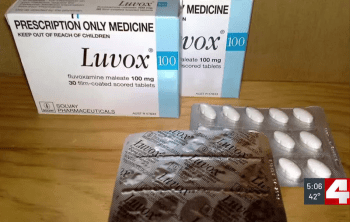
By Russell Kinsaul Published: Mar. 18, 2024 at 5:55 PM CDT Check out the Healthy Mind Lab’s current study on long COVID! Researchers at Washington University are leading the way to find a treatment for a debilitating condition that affects as many as 16 million Americans.

ST. LOUIS (KMOV) -A clinical trial at the Washington University School of Medicine is studying the impact of an antidepressant on long COVID symptoms.
Specifically, the study is examining whether Fluvoxamine, a medication used to treat depression and obsessive-compulsive disorder, can relieve problems with “brain fog” and other neurological conditions associated with lingering symptoms.
At a Glance On behalf of Eric Lenze, MD, please check this link for a recent publication of ours posted on the NIH website!
WashU receives part of $103 million to address depression, anxiety related to pandemic

For some patients, two different medications better than antidepressant alone
Check out our recent publication on PubMed about our pilot study exploring Ketamine for treatment-resistant depression (TRD)!

Click the title to be sent to the a recent publication on a Healthy Mind Lab study! For the full article – click here

New to clinical research? Check out our guide!
In healthy older adults, neither led to measurable improvements after 6 months, 18 months
Click to listen to researchers at Washington University Department of Psychiatry discuss the exciting psychedelic research happening right here in St. Louis.
The latest article on the Healthy minds lab study on how fluvoxamine can help treat and prevent sever COVID-19 symptoms.
Another article describing Andrea Fekete and Eric Lenses findings on fluvoxamine’s efficacy against fighting the worst of the COVID symptoms. The article describes the way fluvoxamine allows for the body’s inflammatory system to keep in check due to the presence of the sigma-1 receptor.
CNN’s discussion on the latest study that found that fluvoxamine could reduce the risk of having severe COVID-19 symptoms. “Fluvoxamine may reduce the production of inflammatory molecules called cytokines that can be triggered by SARS-COV-2 infection.”
This is the first large and randomized controlled trial test to test the efficacy of fluvoxamine for acute treatment of COVID-19. In the study, they found an absolute risk reduction of 5.0% and a 32% RR reduction.
Clinicians and researchers at Washington University School of Medicine in St. Louis have received a four-year, $6.2 million grant from the National Institute of Mental Health to launch a center designed to help improve mental health in surgery patients, particularly older surgery patients. The center will conduct studies to identify and treat depression and anxiety in surgical patients. This new center is the first NIH-funded center of its kind in the United States.
Fluvoxamine vs Placebo and Clinical Deterioration in Outpatients With Symptomatic COVID-19 A Randomized Clinical Trial Eric J. Lenze, MD1; Caline Mattar, MD2; Charles F. Zorumski, MD1; Angela Stevens, BA1; Julie Schweiger1; Ginger E. Nicol, MD1; J. Philip Miller, AB3; Lei Yang, MPH, MSIS1; Michael Yingling, MS1; Michael S. Avidan, MBBCh4; Angela M. Reiersen, MD, MPE1JAMA. Published online November 12, 2020. doi:10.1001/jama.2020.22760
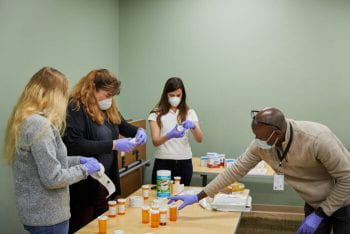
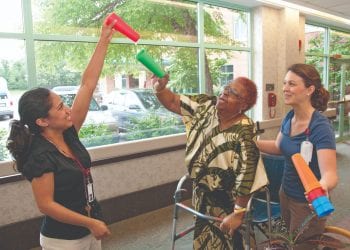
Goal-oriented, motivational physical and occupational therapy helps older patients recover more fully from broken hips, strokes and other ailments that land them in skilled nursing facilities for rehabilitation, according to new research at Washington University School of Medicine in St. Louis.

For some older adults, seeking help for depression may be stressful or embarrassing. Some people can’t find the words to describe how they feel, which can make them feel even more alone. Primary care physicians are usually the first health care provider older adults speak with about their stress, mood, anxiety, loneliness, and concerns about their future.

Dr. Ginger E. Nicol’s new research published in JAMA Psychiatry first to use gold-standard metabolic assessments to link initial antipsychotic exposure in children to developing insulin resistance.

In honor of Mental Health Awareness Month, we shared information about our healthy aging studies for adults ages 60+ on-air with Jennifer Blome of The Big 550 KTRS. Listen to the full recording or read the transcript below. TRANSCRIPT This radio interview aired on May 14, 2018. Jennifer Blome (The Big 550 KTRS): There is […]

In the elderly, falls are a common and important problem. One of the most feared consequences of falling is a hip fracture. Other consequences include other fractures, head injuries, and less serious injuries that can nonetheless impair function and quality of life.
Published each year, Best Doctors Inc. identifies outstanding physicians in numerous disciplines. Physicians are asked “If you or a loved one needed a doctor in your specialty, who would you choose?”
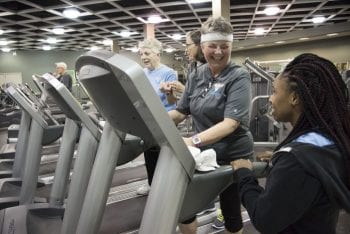
Two research studies in Dr. Lenze’s Healthy Mind Lab, Optimum and MEDEX, are currently recruiting older adults. Optimum aims to improve depression treatment. MEDEX aims to improve memory and concentration.

Volumes of studies show that exercise and meditation help improve aging. The MEDEX study hopes to learn how and why.
About one in six American adults took a psychiatric drug — most often antidepressants, sedatives or antipsychotics — at least once during 2013, according to a new research letter published in the journal JAMA Internal Medicine. Dr. Lenze sheds light on the implications for older adults.

“Older adults who are prescribed antidepressants often find that they don’t get better with the first or second medication they are prescribed,” said principal investigator Eric J. Lenze, MD, a professor of psychiatry. “So what should they get? This will be the largest and, we hope, the definitive study to answer that question. This study will show us which treatments work best and which are safest, and it will help us personalize treatment.”
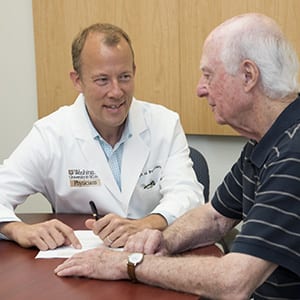

Healthy Mind Lab researchers, led by Dr. Eric Lenze, are looking for better ways to help older adults deal with depression and anxiety through antidepressant medications and mindfulness-based stress reduction